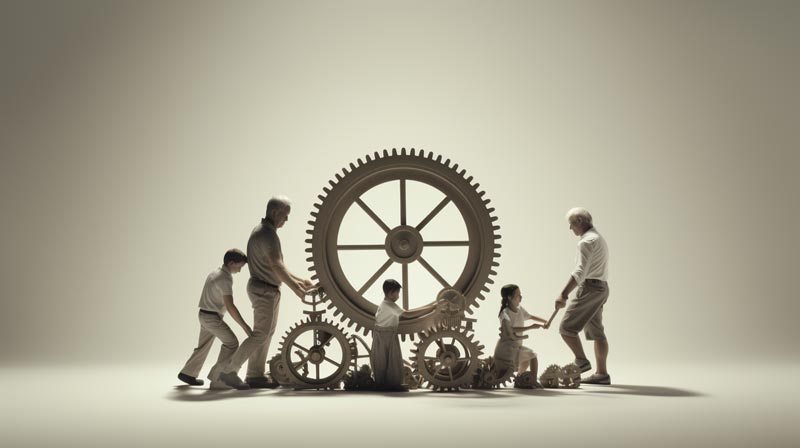Teaching children incremental progress is a concept that resonates with the age-old adage, “Rome wasn’t built in a day.” This saying encapsulates the essence of incremental progress, where every decision made, every stone laid, contributes to the overall progress. We often refer to this as marginal or incremental gains in today’s fast-paced world. Yet, despite understanding this concept, why do we often aim for giant leaps and risk falling into pitfalls?
The answer might lie in the Flywheel concept, a principle I discovered in Jim Collins’ book, ‘Good to Great.’ This concept resonated with me, not just as a reader but as a parent and an engineer. It reminded me of my previous posts, where I explored the principles from the same book and applied them to parenting.
In this post, I want to explore the Flywheel concept and how we can use it to teach our children about the power of incremental progress. But first, let’s revisit the concept and its origins.
Understanding the Flywheel
My journey with the flywheel began in 1994 as a 16-year-old embarking on a motor-vehicle studies course. In its simplest form, a flywheel is a heavy wheel attached to a rotating shaft (axle) designed to smooth out the engine’s power delivery. The flywheel’s inertia combats engine speed fluctuations and stores excess energy for intermittent use.
This mechanical concept, though simple, carries profound implications when applied to our daily lives and endeavours. It’s about building momentum, about the cumulative effect of consistent effort. It’s about understanding that every push and action contributes to the overall motion and progress.
Jim Collins applied this mechanical concept to the business world, but its principles are universal. They can be applied to personal growth, to learning, and, yes, to parenting. And this post becomes a tool for teaching children incremental progress.

The Flywheel in Everyday Life
Jim Collins applies the flywheel concept to companies, illustrating how they can build cumulative effort or progress. He emphasises that there’s no single defining action, no grand program, no killer innovation, no solitary lucky break, no wrenching revolution. Going from good to great is a process of step-by-step, action by action, decision by decision, turn by turn of the flywheel, leading to sustained and spectacular results.
This concept applies to more than just businesses. This principle can be applied to our personal lives, goals, and parenting strategies. It’s about understanding that every small action we take, every lesson we teach our children, contributes to their overall growth and development.
In my previous posts, I explored how the principles of ‘Level 5 Leadership‘ and the ‘Hedgehog Concept‘ from Collins’ book can be applied to parenting. This time, I want to focus on the Flywheel concept and how we can harness its metaphorical power for teaching children incremental progress.
Teaching Children Incremental Progress
As a parent, I’ve often wondered how to convey the concept of step-by-step progress to my children. How do I teach them that every small effort contributes to their growth? That’s where the Flywheel concept comes in.
Imagine trying to get a heavy flywheel rotating on an axle. You push with great effort and get the flywheel to make one turn after some time. You keep pushing, and the flywheel begins to move a bit faster. With continued effort, you move it to a second rotation. You keep pushing consistently, and the flywheel builds up speed, moving faster with each turn.
At some point, the momentum of the flywheel kicks in your favour, hurling forward, turn after turn. The heavy disc flies with almost unstoppable momentum. Now, if someone were to ask you, “What was the one big push that caused this thing to go so fast?” You wouldn’t be able to answer. All the pushes were added together, and an overall accumulation of effort was applied consistently.
This is a powerful way to explain to children the importance of building step-by-step and day-by-day. It’s about showing them that every small effort is like a push on the flywheel, contributing to their overall progress and growth.

Final Thoughts on Teaching Children Incremental Progress
I don’t claim to be a parenting guru or strive to become one. What I am, however, is a passionate advocate for concepts that illuminate our everyday experiences. I’m drawn to theories that help us unravel the complexities of our world.
Teaching children incremental progress is about more than just helping them achieve their goals. It’s about equipping them with a mindset that will serve them well in all aspects of life. It’s about showing them the power of consistent effort, perseverance, and belief in the process.
The Flywheel concept is a powerful tool to do just that. Let’s share Jim Collins’ flywheel concept with our families. After all, every push we make on our flywheels and every effort we put into our personal growth is a lesson for our children. And who knows? They might start pushing their own flywheels too.


